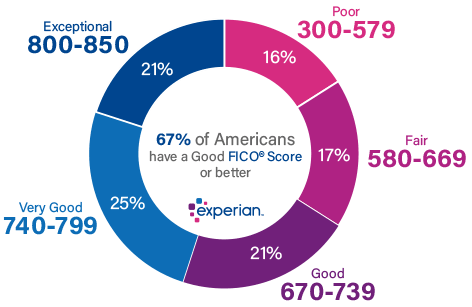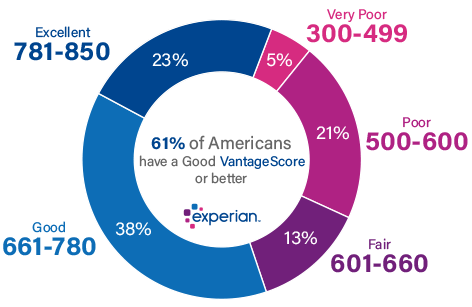In this article:
There are many ways to check your credit for free, and knowing where you stand could help you estimate whether you can qualify for a new loan or credit card. However, you'll want to pay close attention to which credit score you receive, understand what the score means and why the score you checked might be different from the one a lender uses to evaluate your application.
How to Check Your Credit Scores
You can check your credit scores from various sources, often for free. Depending on the source, you might receive a credit score from either FICO or VantageScore®. Both credit scoring companies calculate several versions of their credit scores, and the scores can be based on your credit report from either Experian, TransUnion or Equifax.
FICO and VantageScore each maintain lists of where you can get one of your credit scores for free—there are hundreds of options. But most fall into one of the following categories.
1. Check With the Major Credit Bureaus
The major credit bureaus might offer you a free copy of your credit report and a free or paid credit score based on the report. With Experian, you can get your credit report and FICO® Score☉ 8 for free. An Experian account also comes with free credit report and score tracking, so you can get notified of changes in your credit report and track your score over time. You'll also receive tips for improving your credit score.
2. Use a Free Credit Score Website
Some websites offer a free credit score to their users as an incentive for creating an account. The type of score and underlying report can vary from one website to the next, as can the insights that the website offers about your score. Sometimes, the websites offer paid subscriptions with additional features or show users loan or credit card offers.
3. Check With Your Credit Card Issuer or Lender
Many credit card issuers and lenders give current cardholders and borrowers a free credit score. The score often gets updated with your monthly statement and it might be the same one that the company uses to evaluate new applicants and current customers. Find out if any of your current creditors offer this as a free service and whether you automatically get your credit score each month or have to sign up for the free credit score program.
4. Visit a Nonprofit Credit Counselor
If you have questions about your credit, budgeting, buying a home, bankruptcy or managing your credit card debt, consider a free meeting with a nonprofit credit counselor. Credit counseling agencies can help with various financial questions or problems, and a counselor can help you check your credit score and explain how to improve your credit.
What Are the Credit Score Ranges?
Most credit scores range from 300 to 850. Improving your credit score can help you qualify for more financial products, lower interest rates and fewer fees. Many creditors also break down the credit score range into smaller groups.
Although creditors can choose their own definitions or ranges for these groups, FICO and VantageScore offer their own benchmarks you can use to understand where you fall. For example, a good credit score could be a FICO® Score from 670 to 739 or a VantageScore from 661 to 780.


What Do Credit Scores Mean?
Credit scores help organizations quickly assess the risk that someone they lend money to won't repay the loan. Most credit scores are designed to rank people based on the likelihood that they'll miss a payment by at least 90 days within the next 24 months. The higher someone's score, the less statistically likely they are to miss a payment.
Having a high credit score can help you qualify for the best offers and terms because lenders know they're less likely to lose money. Conversely, if you have a low credit score, you might have to pay high interest and fees. Or, you might not be able to qualify at all.
What Factors Affect My Credit Scores?
Most credit scores only consider information from one of your credit reports to determine your score. But the scores use complex calculations, and the impact of each new data point depends on the rest of the information included in your credit profile. In other words, it's impossible to say that a specific action will have the same credit impact for everyone.
There are, however, general categories of what affects your scores. You can order these from most to least important based on how the factors within each category tend to affect your score. These factors are ranked as follows:
1. Payment History
Your payment history is virtually always the most important factor in your credit scores. On the positive side, paying bills on time can improve your credit. On the other hand, late or missed payments, collection accounts and filing for bankruptcy can drastically hurt your scores.
2. Amount of Debit
The number of accounts you have with balances and your progress repaying loans also have a large impact on your credit scores. One of the most important factors within this category is your revolving credit utilization ratio, which measures how much of your credit limit you're using on your credit cards. A low utilization ratio is best for your scores.
3. Length of Credit History
The age of the oldest and newest accounts in your credit report, and the average age of all your accounts, can also affect your scores. Generally, the longer you've used credit, the higher your scores.
4. New Credit
Opening new accounts and applying for credit, indicated by a hard inquiry in your credit report, can also affect your scores. In general, a hard inquiry might hurt your scores a little. This category doesn't have a major impact on your scores, and opening new credit accounts is often a necessary step for building good credit over time.
5. Credit Mix
Having open revolving and installment credit accounts shows that you can manage multiple types of credit, which might help your credit scores. This also isn't a major scoring factor, however, and you shouldn't open new credit accounts with the sole purpose of improving your credit mix.
Why Your Credit Scores May Differ Across the Credit Bureaus
You might see different results if you check your credit scores with several services—it's not an error, and one score isn't more "real" than another. What might be happening is that the services offer different types of credit scores. For example, Your VantageScore and FICO® Scores tend to differ from one another. Both companies also create several versions of their credit scores.
Another reason you'll see different scores is that the services use different credit reports. For instance, you receive your FICO® Score 8 from Experian for free, and that score depends on what's in your Experian credit report. However, a FICO® Score 8 based on your TransUnion or Equifax credit reports will likely be different. And even if the scoring models are nearly identical, there could be minor differences in your credit reports.
Score differences can happen when you have a credit card or loan that only gets reported to one of the bureaus. Or when you apply for a new credit account and the creditor only checks one of your credit reports, leading to a new hard inquiry in that report. Since the other two reports don't have the account or hard inquiry, different scores will likely result.
How to Get Your FICO® Score for Free
Understand the reasons that help or hurt your FICO® Score, including your payment history, how much credit you are using, as well as other factors that influence your overall credit.
Does Checking Your Credit Score Lower It?
Checking your credit report and scores never affects your credit scores. When you check your credit, a record of the request gets added to the credit report. However, it's recorded as a soft inquiry. And, unlike hard inquiries, soft inquiries don't affect your credit scores.
Monitor Your Credit Score for Free
Experian's free account includes your credit report and FICO® Score, and you receive ongoing credit score monitoring, so you can see how your score changes over time. You can also receive insights into the factors that are affecting your credit score the most and get tips on how to improve your score.

